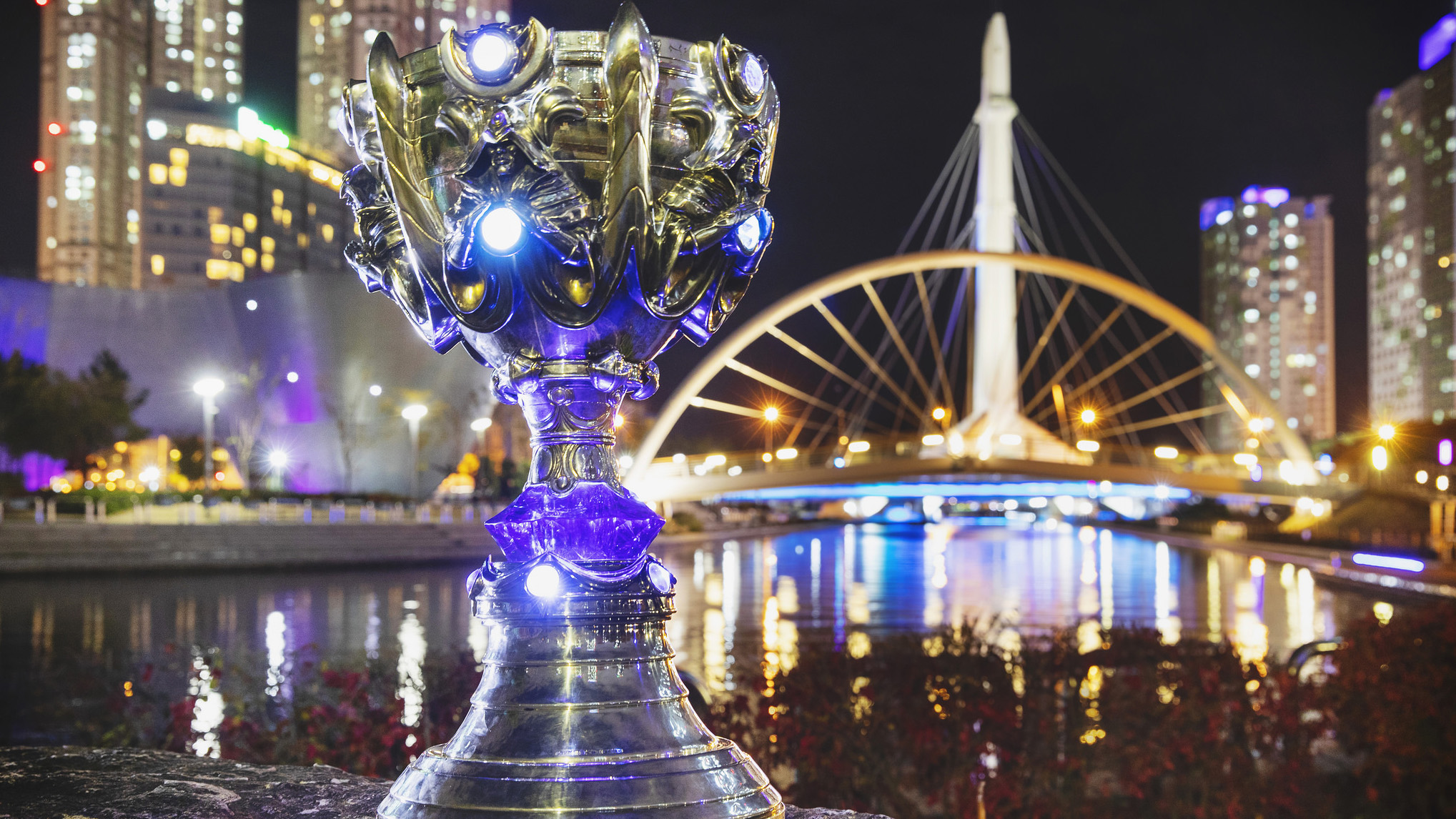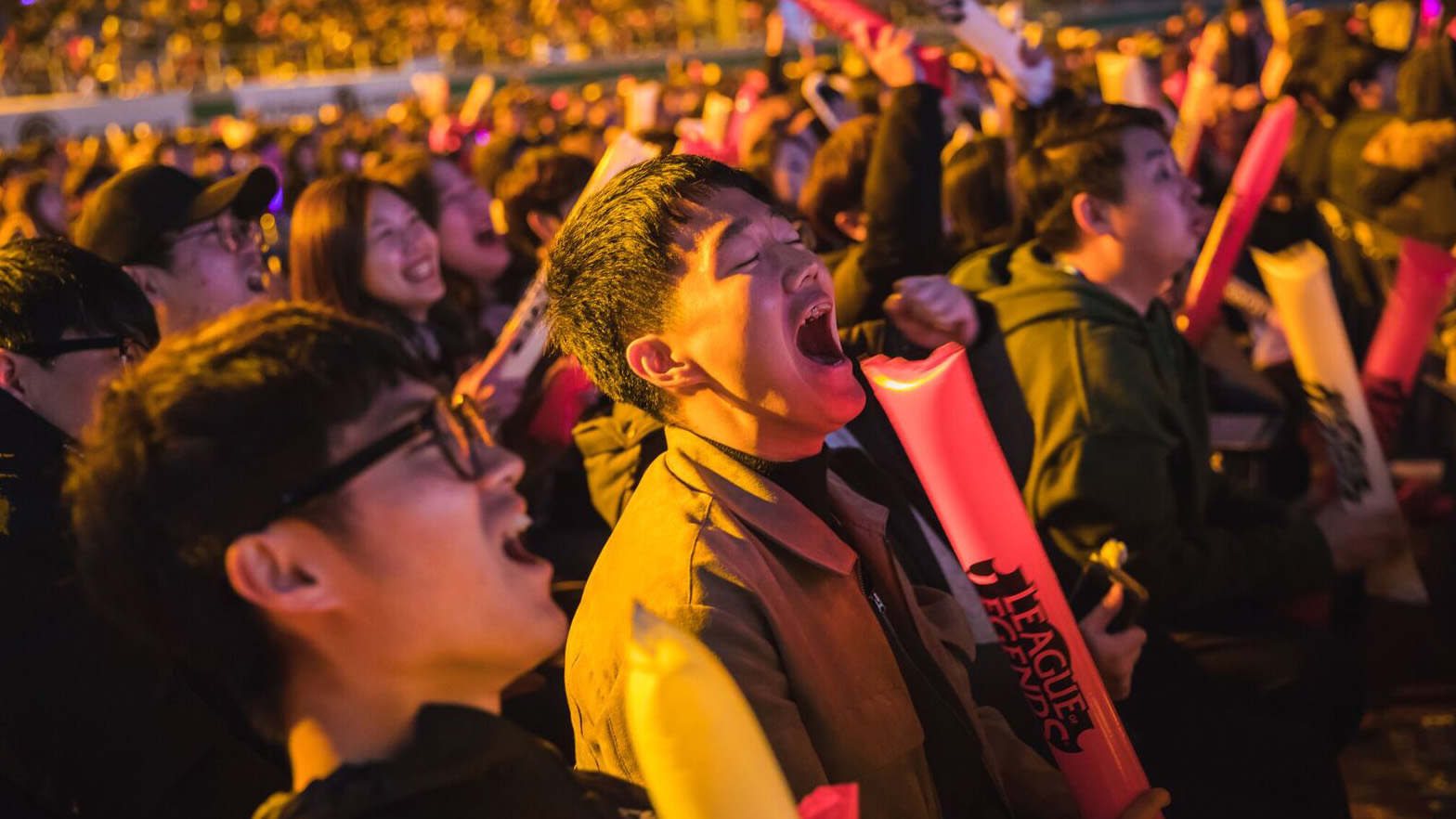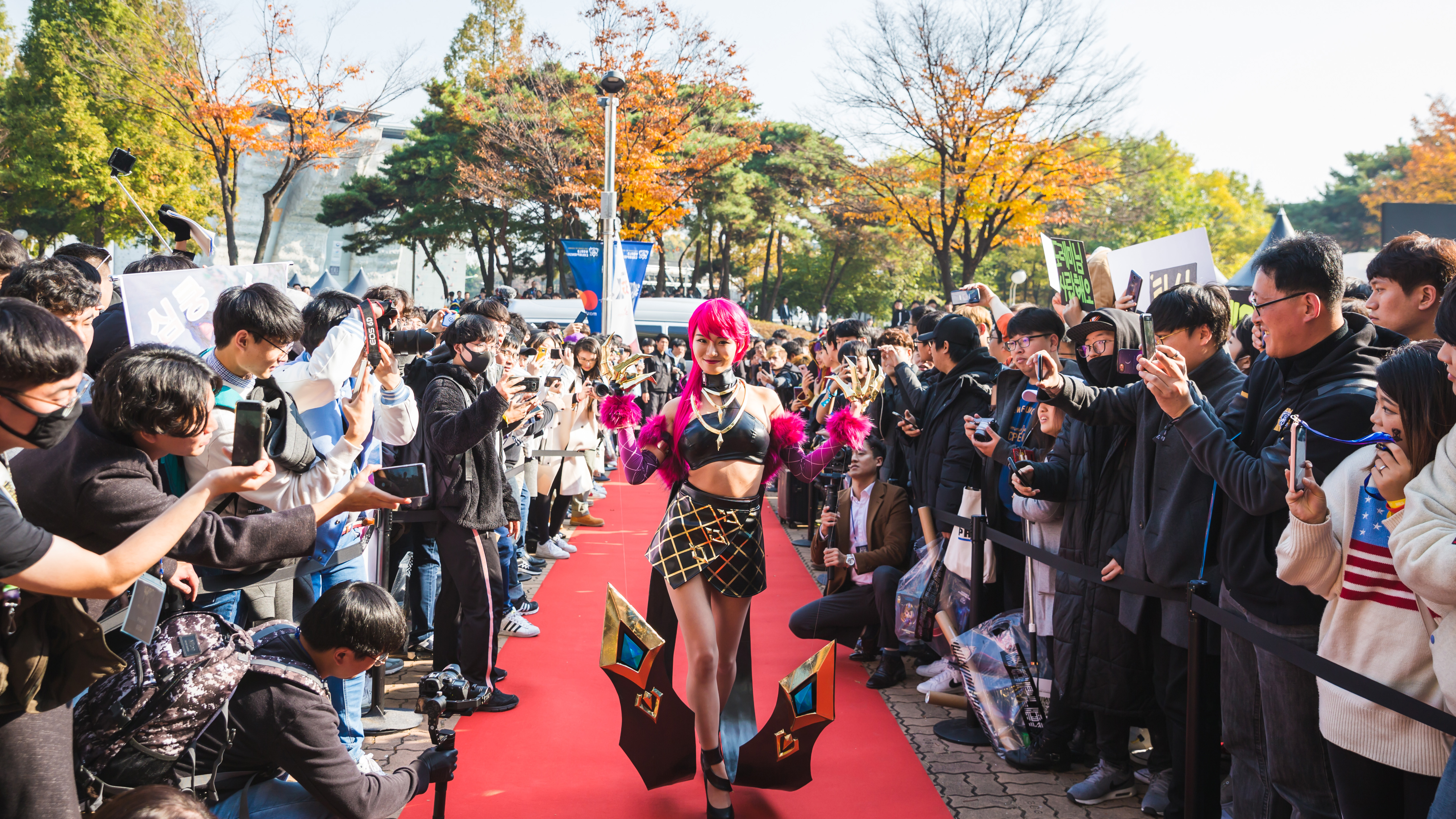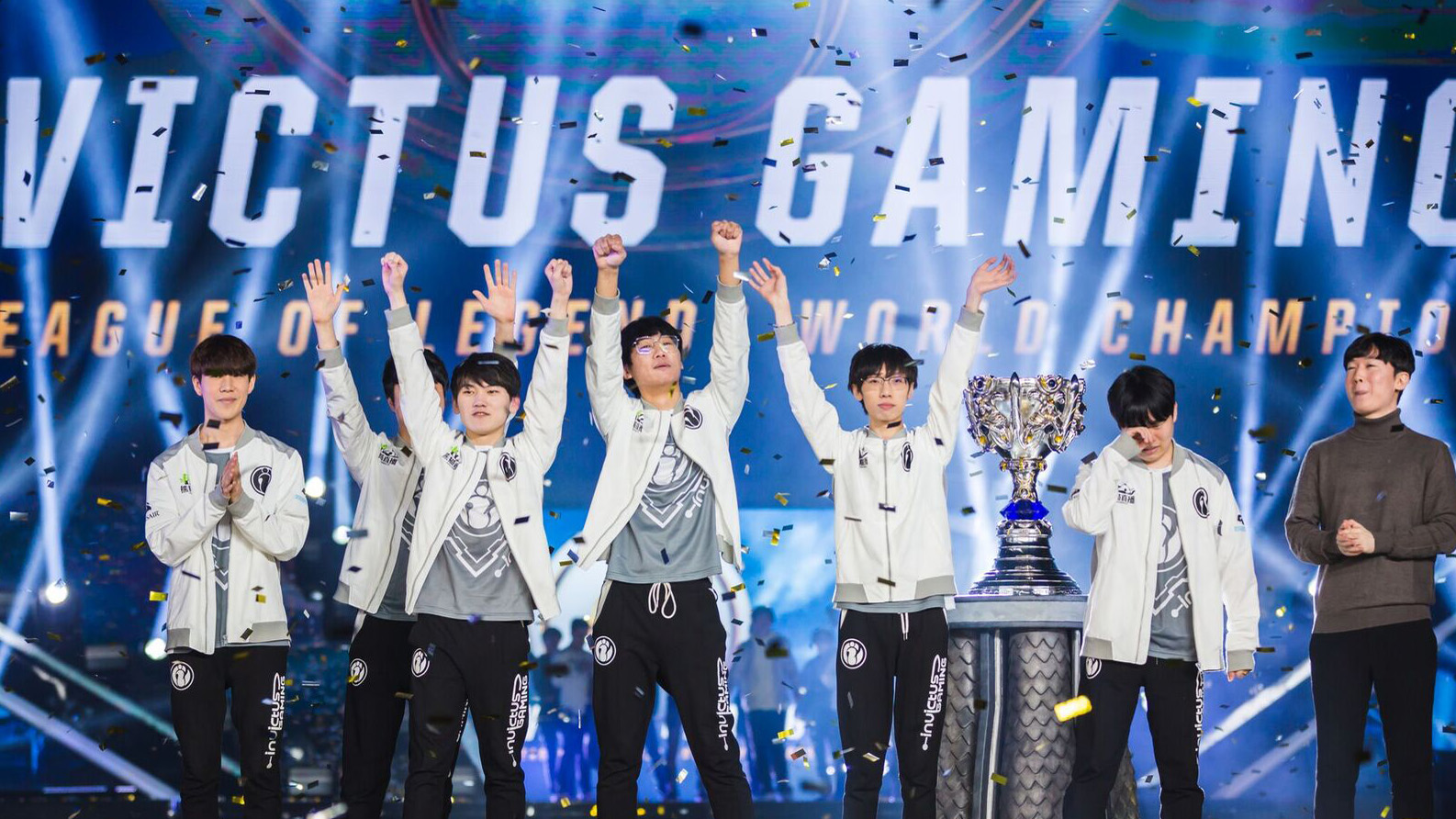How 20,000 League of Legends fans convinced us esports is ready for prime time

Sign up for breaking news, reviews, opinion, top tech deals, and more.
You are now subscribed
Your newsletter sign-up was successful
As the sun sets over Incheon Munhak Stadium in South Korea, more than 20,000 eager fans pour into the concrete coliseum with handmade signs and merchandise spilling from their arms. The atmosphere is electric as people bustle to their seats and take selfies with brand-new friends.
You’d be forgiven for thinking this was the Superbowl or World Cup final, some large-scale sporting event which has attracted people from all over the globe, and it technically is – it just happens to be the League of Legends World Championships final.
We attended the League of Legends finals in South Korea, an event watched by over 60 million people last year alone. It’s one of the biggest esports events in the world, for one of the most popular games in the world, yet many people know very little about it.
League of Legends

Esports in general have seen a surge in popularity in the past few years – there’s talk of esports being included in a future Olympic Games, and teams from Los Angeles and Paris bidding for the 2024 games have pledged to showcase esports in some fashion if they’re successful. And much of that success has been driven by League of Legends.
For those unfamiliar with the game, League of Legends is a MOBA (multiplayer online battle arena) developed by Riot Games. Despite only releasing in 2009, the title has spawned one of the biggest professional esports tournaments in the world: the League of Legends World Championships.
The cash prizes for the biggest esports tournaments run into millions of dollars, with the prize money for this year's League of Legends World Championships estimated at $5 million, which just adds to the tension of an event that’s already an emotional rollercoaster for players and fans alike.
Conferences and confidence

The two teams facing off against one another this year are Chinese team Invictus Gaming and European team Fnatic. The day before the main event we attend a press conference with both teams in LoL Park – Riot Games’ League of Legends Champions Korea arena.
Sign up for breaking news, reviews, opinion, top tech deals, and more.
Fnatic are the first to come out, and what’s immediately striking is the age of the players – the youngest, Rasmus ‘Caps’ Winther, is only 18 years old, while the oldest among the lineup is Martin ‘Rekkles’ Larsson, who’s just 22. They’re barely out of their teens, yet they remain composed in front of an arena full of the world’s gaming press firing questions about everything from planned strategies to how their parents feel about their career choice.
“My dad is more stressed than I am,” Caps grins as he explains that his father will be arriving in Incheon that day. Like most parents of gamers, Caps’ father fails to understand the game itself, but he’s supported his son from his first competitive match in Turkey to the upcoming finals.
Questions continue about how much pressure the individual players feel, particularly as this is the first time a Western team has made it to the finals since 2014. The Fnatic players shrug off such talk, although coach Dylan Falco describes the feat as a “great accomplishment”.
Invictus Gaming undergo the same ordeal by media, answering questions posed in Chinese, Korean and English on what they felt their chances of winning were, and which players on the opposing team posed the biggest threat, before posing for photos.
Virtually famous

I’ve watched League of Legends on Twitch and I’ve even attended the quarter-finals for World Championships when they came to London – but nothing quite prepared me for the sheer spectacle of the finals. Although I arrive hours before the event is due to begin, the grounds of the stadium are already heaving with fans – some dressing as their favorite champions, as characters in the game are called, and others simply kitted out in their team’s colors.
Unlike some other sporting events, there’s no discord between opposing fans. Everyone seemed thrilled to inhabit a biome of gaming which sees others as equal based on a mutual love of the game. Cosplayers (the official name for those who dress as their favorite characters) walked the grounds like celebrities, as though they themselves were the champions – and why not? We are, after all, deep into the realms of fantasy here.
How you imagine a game tournament to be, and how it actually is, are probably two very different things. Gone are the days of stereotypical gamers in dark, sweaty rooms playing only one another. Modern gaming, and esports, is as big as any major sports event. There are commentators (known as shoutcasters), thousands of fans, stadiums, merchandise, food trucks, and even fireworks. It’s truly remarkable.
This year’s World Championships kick off with Riot Games’ new all-girl virtual pop band K/DA. K/DA were formed as a way of Riot promoting new skins (or cosmetics) for four female League of Legends characters: Ahri, Akali, Evelynn and Kai’Sa. These four champions make up the band – but they also have real-life counterparts in the form of two members of the South Korean girl band (G)I-dle and US artists Madison Beer and Jaira Burns. So how do you make a virtual girl band perform on a physical stage you may ask? Well, actually, it’s really cool.
Check it out below:
As the real-life artists take to the stage, the screens around the arena use AR to show them as the characters they represent. So while on the stage itself the human pop group is performing, the screens make it look as though the characters are performing.
Following the madcap performance from the female artists, which left the crowd pretty gobsmacked, another mash-up band took to the stage – this time a boy band featuring (real-life) artists the Glitch Mob, Bobby of iKON, Mako and The World Alive performing Rise, the official anthem of the Worlds 2018, as the championships are known. Yes, esports events have anthems too.
Game, set and match

As the fireworks die down and the bands vacate the stage, the two opposing teams appear from either side of the stage, looking sufficiently intimidating with their arms crossed. Unlike with other sports, you can’t physically see the players during the game – due to the noise of the stadium, and the importance of strategy during matches, each team is confined to a booth, and you can then see the players personal cams on the main screen – essentially like a stream. And you don’t see all the players at the same time – rather the camera cuts between players depending on what they’re doing.
I’m not going to spend time here trying to explain the intricacies of League of Legends, the strategies employed by the teams or a play-by-play of each match. What I will tell you is that Fnatic got destroyed, losing 3-0 to Invictus Gaming. The level of emotion was overwhelming, with IG players embracing one another and crying as they celebrated their success.
But while the world has its eyes on the victorious, I’m watching the losers – Fnatic. I remember how young Caps looked when I saw him at the press conference, and my heart breaks for him as his eyes well up. Years of dreams, dedication and hard work dashed in just a few hours, the European flame extinguished.
It’s easy to forget while watching these players, who are essentially superstars in their field and earning salaries unimaginable to others their age, that they’ve trained their whole lives for this moment, just like any traditional sportsperson would.
Although esports is still some way off being taken seriously by the mainstream, it’s a rapidly growing phenomenon that’s filling stadiums around the world – and once you’ve witnessed it first-hand it’s hard to escape the feeling that mainstream recognition is just around the corner.
An award-winning games journalist, with seven years of experience in games journalism and a degree in journalism from City University, London, Vic brings experience from IGN, Eurogamer, The Telegraph, VG247, Dot Esports and more to the TechRadar table. You may have even heard her on the radio or speaking on a panel, as she’s previously appeared on BBC Radio 4, BBC Radio 5, BBC Radio Ulster and more. Not only is Vic passionate about games, but she's appeared on both panels and podcasts to discuss mental health awareness. Make sure to follow her on Twitter for more.